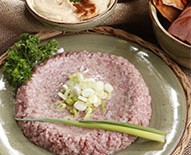100 Arab American women raise $10,000 for cancer fund
Organized by the Center for Arab American Philanthropy, the event raised $10,000 for the Belinda Sue Fund, Inc., an organization that, according to its website, raises awareness of ovarian cancer and supports research for effective early detection.
Guests of the event gathered for a strolling buffet inside the AANM’s newly opened Annex room which sits adjacent to the museum.
On Saturday, that voice was represented by academics, professionals, and, as guest Edna Zaid noted, “founders of the Palestinian-Detroit community.”Zaid was referring to Jamilah Okab and Hala Ajluni. (Both of their stories can be heard, in their own words, in the 2013 documentary “Voices Across the Divide”). Well-respected in the community in her own right, Zaid was named 2012 Woman of the Year by the Arab-American Women’s Business Council. All three women threw their support behind the Arab Heritage Council of Flint.Guests Soumaya Harb and Mariam Bakri supported Zaman International which, they said, provides clothes and housewares to new refugees and a “moving pantry” which distributes unused restaurant food to those in need. Other charities supported included the Ronald McDonald House Charities of Ann Arbor, the Islamic Cultural Association in Farmington Hills, and Alternatives for Girls in Detroit.
Now in its second year, 100 Arab American Women Who Care is based on a crowdfunding model where each guest contributes $100 and submits the name of her preferred charity. After all of the guests have arrived, the charity names are thrown into a basket and then three charities are chosen randomly. This year’s three charities included the American-Arab Anti-Discrimination Committee, Zaman International, and, of course, the Belinda Sue Fund. Then, one supporter of each of the three chosen charities goes on stage to talk about why her charity is the most worthy. After that, each guest writes her choice on a ballot. After all of the ballots have been collected and tallied, the winner is announced.
Karma Adra spoke in support of the Belinda Sue Fund, Inc. Her mother suffered from ovarian cancer which, Adra gratefully reported, is now in remission.
For Adra, supporting the fund was an opportunity to give back to an organization that is working for her mom and for all women: “You draw yourself toward organizations that are going to help the people affected by the illness.”
She hopes the $10,000 grant will enhance the fund’s capacity to raise awareness of ovarian cancer: “It is preventable,” she said.
The power of this event isn’t only in the impact it has on a single charity, like the Belinda Sue Fund. For Freji, the event illustrates CAAP’s capacity to bring philanthropic-minded individuals together to make a greater impact than each of them could on their own. The result, says Freji, is that “$100 becomes $10,000.”
For more information on CAAP, visit centeraap.org.


